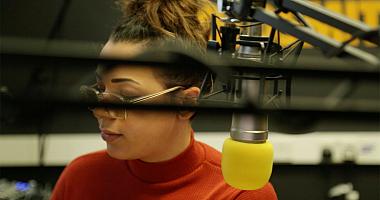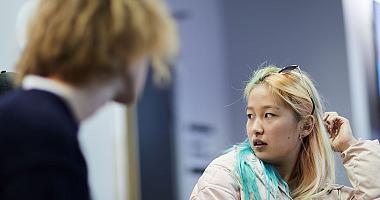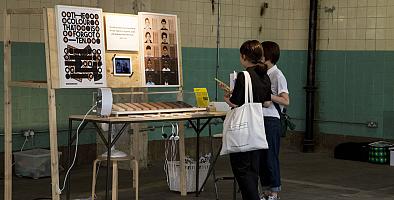MA
Cultural Studies
Content navigation menu
Why study MA Cultural Studies at Goldsmiths
The MA Cultural Studies offers an interdisciplinary approach to the study of contemporary to culture, politics and society.
- Explore Cultural Studies’ impact and influence on a wide range of research interests, not only in the English-speaking world but also internationally. The programme teaches you a range of methodologies that you can then apply in your own writing and research. It gives you a background in the tradition/s of Cultural Studies.
- Examine the effect of media technologies, racialisation and gendering on the production, circulation and consumption of popular culture. Topics include music scenes, the prison industrial complex, national boarders, and neoliberalism, for example. Approaches include representation, embodiment and decolonisation.
- Discover your own path through the fields of Cultural Studies, and apply what you have learned to your own research in the form of your chosen dissertation topic on which you will receive appropriate guidance and support from your supervisor.
- Media, Communications and Cultural Studies (MCCS) is an extremely broad and open-minded department – even by Goldsmiths' standards – and we are committed to making your interests as welcome as possible. We are a large and highly interdisciplinary department, and the themes of cultural studies run through the research interests of many academics within it. These span the fields of music, film, digital media, aesthetics, cultural industries, gender and queer studies, postcolonialism, journalism, political economy, critical race studies, and critical theory.
- Immerse yourself in a postgraduate environment shared by numerous creative practice-based MA programmes, such as MA Filmmaking, MA Journalism, and MA Script Writing. You will also share interests and activities with students from several sister programmes, such as MA Race, Media and Social Justice, MA Postcolonial Culture and Global Policy, and MA Culture Industry.
- Participate in extra-curricular activities with field trips to the Stuart Hall archive for instance and Sound System Outernational (SSO) events. These offer opportunities to meet up with students on other programmes, and become involved in Lewisham’s local music scene.
- Our department has been ranked second in the UK for 'world-leading or internationally excellent' research (Research Excellence Framework, 2021) and 16th in the world (third in the UK) in the 2024 QS World Rankings for communication and media studies.
- Study in one of London’s liveliest and most diverse communities. You will study in a stimulating critical and creative research-led environment, which will prepare you for employment in a range of culture-related professions.
Contact the department
If you have specific questions about the degree, contact Professor Julian Henriques.
Length
1 year full-time or 2 years part-time
Entry requirements
You should have (or expect to be awarded) an undergraduate degree of at least 2:1 standard in a relevant/related subject. You might also be considered if you aren’t a graduate or your degree is in an unrelated field, but you have relevant experience and can show you can work at postgraduate level.
Fees
Home - full-time: £10450
Home - part-time: £5225
International - full-time: £21000
Department
As a postgraduate Cultural Studies student, you have the opportunity to develop the theoretical skills and methodological tools to engage with the critical contemporary issues as they are expressed in popular culture. You engage with some of the key theorists and the significant debates in the Cultural Studies tradition, from its inception in Britain dating from the 1970s to its current concerns in the USA and internationally.
The programme enables you to apply a Cultural Studies approach to particular examples, case studies, events and consumer technologies and to larger-scale institutions or economic and political systems. Cultural Studies permits close analysis of topics such as race, youth, music, fashion, and creative economies, as well as embracing the history of sexuality, emotions and affect, national identities and popularism and the cultural dynamics of precarity and austerity, art, and cultural expression for the new feminist activism. The analysis the Cultural Studies approach offers is geared towards intervention in current debates.
Course structure
This is a programme which in the first compulsory course offers a different topic each week permitting the exploration of various methodologies and approaches. The first five weeks will present you with work from the Birmingham tradition and beyond to the present day, including neo-nationalism, race and ethnicity, policing and the prison system, gender and popular feelings, and the rise of queer theory.
The second five weeks turn to media technologies, sonic cultures, gender and social media and more broadly issues of cultural production and consumption. The second compulsory course provides an intense engagement with questions of cultural theory, capitalist society, new activisms, and the politics of protest and assembly.
The programme’s modules can include the different ways in which culture itself is to be understood in terms of technologies, practices, subjectivities and capitalist social formations. Options modules are available within the department at either 15 or 30 credit levels. Further option modules can also be taken in the Anthropology, English and Creative Writing, History, Politics and Sociology departments. As if not enough, students are also encouraged to ‘audit’ modules – attend lectures (but not seminars), without enrolling for assessment.
What you'll study
| Module title | Credits |
|---|---|
| Cultural Studies and Capitalism | 30 credits |
| Doing Cultural Studies | 30 credits |
| MA Cultural Studies Dissertation (Methodology and Research) | 60 credits |
How you'll be assessed
Depending on the options chosen assessment consists of coursework, extended essays, presentations, practice-based projects or essays/logs, group projects and/or reflective essays.
All assessed work is accompanied by some form of feedback to ensure that your work is on the right track. It may come in a variety of forms ranging from written comments on a marked essay to oral and written feedback on developing projects and practice as you attend workshops.
Entry requirements
You should have (or expect to be awarded) an undergraduate degree of at least upper second class standard in a relevant/related subject.
You might also be considered for some programmes if you aren’t a graduate or your degree is in an unrelated field, but have relevant experience and can show that you have the ability to work at postgraduate level.
International qualifications
We accept a wide range of international qualifications. Find out more about the qualifications we accept from around the world.
If English isn’t your first language, you will need an IELTS score (or equivalent English language qualification) of 6.5 with a 6.5 in writing and no element lower than 6.0 to study this programme. If you need assistance with your English language, we offer a range of courses that can help prepare you for postgraduate-level study.
How to apply
Apply directly to Goldsmiths using our online application system
You apply directly to Goldsmiths using our online application system.
Before submitting your application you’ll need to have:
- Details of your academic qualifications
- The email address of your referee who we can request a reference from, or alternatively a copy of your academic reference
- Copies of your educational transcripts or certificates
- A personal statement – this can either be uploaded as a Word Document or PDF, or completed online. As well as telling us about your own interests and ambitions, please include in your personal statement why you want to study this particular MA Cultural Studies programme at Goldsmiths in the Media, Communications and Cultural Studies department. What are the particular parts of the programme that interest you? Which staff research area are you most interested in? Please also see our guidance on writing a postgraduate statement
You'll be able to save your progress at any point and return to your application by logging in using your username/email and password.
When to apply
We encourage you to complete your application as early as possible, even if you haven't finished your current programme of study. It's very common to be offered a place that is conditional on you achieving a particular qualification. Late applications will only be considered if there are spaces available.
Find out more about applying.
Fees and funding
Annual tuition fees
These are the PG fees for students starting their programme in the 2025/2026 academic year.
- Home - full-time: £10450
- Home - part-time: £5225
- International - full-time: £21000
If your fees are not listed here, please check our postgraduate fees guidance or contact the Fees Office, who can also advise you about how to pay your fees.
It’s not currently possible for international students to study part-time under a student visa. If you think you might be eligible to study part-time while being on another visa type, please contact our Admissions Team for more information.
If you are looking to pay your fees please see our guide to making a payment.
Funding opportunities
Explore the Goldsmiths scholarships finder to find out what funding you may be eligible for.
Paying your fees
Find out about paying your tuition fees.
If you are a UK student you may be eligible for a postgraduate loan.
Meanwhile our Visit the scholarships finder can also offer advice on finding work during your studies.
Additional costs
In addition to your tuition fees, you'll be responsible for any additional costs associated with your course, such as buying stationery and paying for photocopying. You can find out more about what you need to budget for on our study costs page.
There may also be specific additional costs associated with your programme. This can include things like paying for field trips or specialist materials for your assignments. Please check the programme specification for more information.
Careers
Where this degree can take you
Around half of students completing this programme progress to PhD level, and others go into practical work – in the creative industries and in NGOs in a great number of countries.
Find out more about employability at Goldsmiths.
Skills
High-level knowledge of cultural research; transferable skills within social and critical theory, aesthetics and performance, communication and multimedia; ethnography skills; critical appreciation of current debates in the media, the culture industries and the wider contemporary cultural environment.




.jpg)
